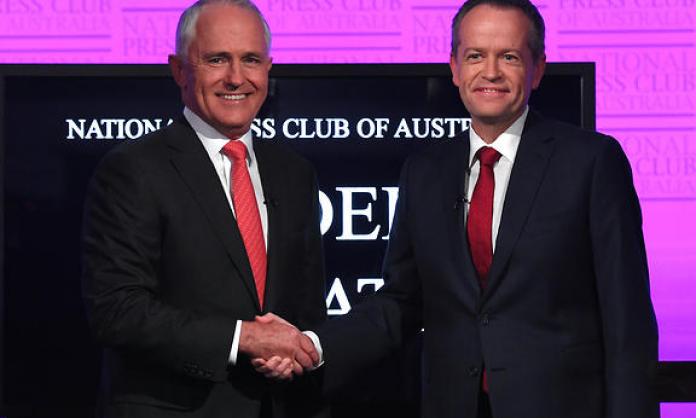In the barbecue of Australian political life, this federal election would have to be the vegetarian sausage: obligatory, but inevitably failing to arouse much interest and afterwards leaving you wondering why you even bothered. Even the apparently neck and neck polling of the Labor and Liberal parties seems to speak more to the virtual indistinguishability of the candidates than it does to a hard-fought political contest.
Indeed, for all the bombast and feigned indignation, there is a furious consensus at the heart of this campaign. Supporting business, increasing productivity, attracting investment, maintaining Australia’s triple A credit rating: these are the gods unto which nothing is too important to be sacrificed.
Both major parties have vowed to return the budget to surplus by 2020-21 and oppose increased spending, including for much needed social services. Both support cutting money from universities and lowering the threshold at which students are forced to repay HECS debts. Both support giving massive subsidies to private health care providers, even while they make unconvincing assurances about preserving Medicare. Neither promises any improvement in living standards for workers.
In apparent defiance of the laws of physics, most of us are left entirely unmoved by the budgetary black hole. Instead, poll after poll indicates that what most people want to see from government is better funded and higher quality hospitals, schools and universities, and proper support for the unemployed and elderly. A poll taken by the Australian National University in April found that 55 percent of people preferred higher taxation over cuts to social services, while only 36 percent favoured the opposite.
The Liberals learnt this the hard way in 2014, when their budget, which set out grandiosely to end the “age of entitlement”, instead brought about the unceremonious end of the Abbott government.
Labor, by contrast, has attempted to appeal to this popular consensus, dusting off some of its social democratic phraseology and turning up at the occasional function without a tie. Undoubtedly, its proposal for a royal commission into the banks, opposition to the Australian Building and Construction Commission and disinterest in corporate tax cuts are broadly popular and set it apart from the Liberals.
But these policies have not formed the central focus of Labor’s campaign. Instead – and with one eye always on the corporate elite – Labor has emphasised its economic responsibility, vision for restructuring after the mining boom and plan to get the budget back into surplus.
Typical of this are Labor’s political gymnastics on penalty rates: while presenting itself as the defender of them against the Liberals, Labor simultaneously refuses to back the Greens’ proposal to protect them through legislation and has indicated it will not fight the Fair Work Commission to defend them.
So as Labor and Liberal increasingly take part in an obsessively stage-managed competition for the affections of the big end of town, it’s no wonder that various independents continue to attract support. Their less scripted style and outsider status hold an appeal, even though, with perhaps the exception of Ricky Muir, they have no more interest in standing up for workers’ rights than their mainstream rivals. A vote for them is not a left wing vote.
Nor do the Greens offer a left wing alternative. While it is to their credit that they have not abandoned all human decency in relation to refugees and the environment, they make no secret of their commitment to capitalism and the logic it entails. They support developing profit-driven green industries rather than building union campaigns to demand environmental justice for workers, and prioritise working with business over mobilising people to defend their rights against the rich. So while many left wing people will vote Greens as a way of showing their disgust with Labor, the Greens will not be able to offer a solution to declining living standards, inequality or underfunded services.
In other ways, and despite its interest level being about the equivalent of a celery stick at a kids’ party, this election has been a break from the usual routine. In stark contrast to 2013, it will not be won by jingoistic appeals to trash the rights of refugees or by cheering on torture camps.
Partly this is because Labor has capitulated so utterly on these issues. But it is also because of what Turnbull represents: an attempt to put a more sophisticated face on an austerity agenda, in the style of Angela Merkel in Germany, John Key in New Zealand or David Cameron in Britain (awkward). Whether he is seen to have succeeded or failed will have long term consequences for the Liberal Party and the ruling class’ austerity agenda.
It’s essential that Turnbull is kicked out of office this election, even if in the short term it strengthens the hand of the loony right of the Liberal Party. A slick salesman of a right wing economic policy is far more dangerous than a gauche and incompetent one who has the potential to provoke a determined reaction from our side. But whatever the outcome, there will need to be a fightback against cuts.
The bosses are reasonably ambivalent about the election because they are satisfied that either party will do their bidding in office. The rest of us are ambivalent because we know they won’t do ours. What is needed is a genuine alternative prepared to stand up for the interests of workers against those of the rich and their political lackeys. We need a force that looks not to parliament but to the actions of the mass of people to bring about change – in the workplaces, universities and on the streets.
Such a fightback needs to be informed by politics that don’t simply replicate the failed approach of the existing reformist parties, but offer a real alternative to the neoliberal consensus that pervades official politics. We can’t just sit back and wait for this to come about. We need to fight for it now.









